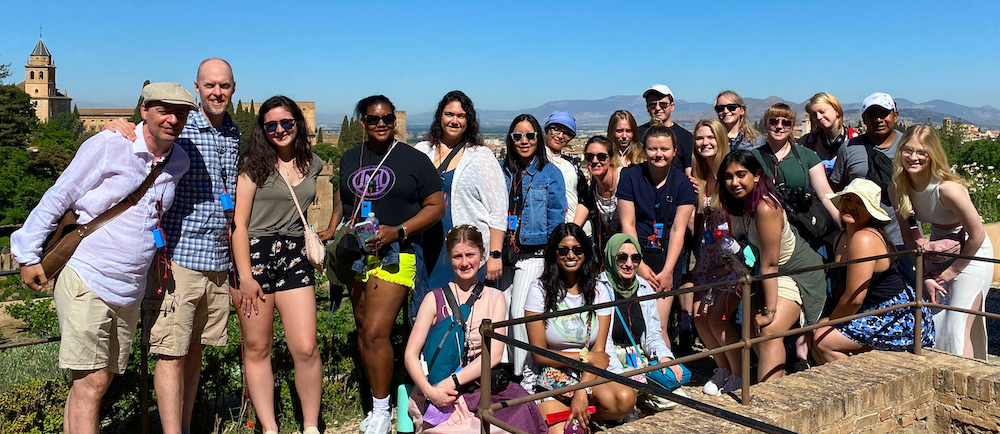A group of 20 George Mason University students traveled to Spain in May with this question in mind: What can we do to move society toward mutual understanding, respect, and a focus on the common good?

As part of a field study summer course called “Leadership Across Difference: Lessons from Medieval Spain,” Nick Lennon, director of Mason’s Leadership Education and Development (LEAD) Office, and Stephanie Zeher, office manager and executive assistant for Mason’s School of Integrative Studies, led the students in the three-credit summer course to Toledo, Cordoba, Seville, Granada, and Madrid.
The goal was to prepare the students to be more effective, ethical leaders by examining how different religious groups were or weren’t integrated into society in medieval Spain.
Throughout the medieval era, part of what is now Spain was ruled by an Islamic civilization called Al-Andalus. During this time, Muslims, Christians, and Jews reportedly collaborated and lived together in relative peace for hundreds of years.
“Medieval Spain holds many relevant lessons for how we can get along and exhibit ethical leadership across our differences today, whether those differences are religious, racial, political, or otherwise,” Lennon said.
During its 10-day trip, the group participated in site visits, workbook readings, and group discussions to explore what unites us—and divides us—across our differences.
“Learning about how Spain passed through the hands of many different rulers and religions and seeing how the communities changed depending on the leadership was fascinating,” said Ariana Licausi, a current senior integrative studies major also starting Mason’s Bachelor's/Accelerated Master's program for elementary education.
Recognizing the qualities of good and bad leaders was important, Licausi said, to “understand the type of person I need to be to become a successful and ethical leader in my future career as an elementary school teacher.”
For Hannah Castillo-Villanueva, a rising sophomore psychology major, the program was more than an opportunity to visit a new country and encounter new cultures; it was also a way to grow her Mason experience.
As a student who takes online courses, the trip allowed her to grow closer to the Mason community by connecting with and hearing the perspectives of other students from a variety of majors, she said.
It also enhanced her Mason education.
With the lessons learned from the historical examples of conflict, cooperation, and collaboration across religious differences, Castillo-Villanueva said she’s more mindful of how decisions can affect everybody—directly or indirectly—and feels better prepared to make the best decisions for organizations she helps lead.
“Students on the program learned from history, and from one another, with the ultimate goal of a more fair and ethical society for everyone,” Lennon said.
